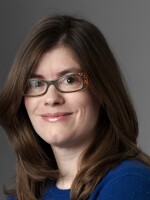The Nobel Prize in Chemistry this year goes to three scientists who made fundamental discoveries about how proteins are made inside cells.
The winners are Venkatraman Ramakrishnan, an Indian-born American who works at the MRC Laboratory of Molecular Biology in Cambridge, England, Thomas Steitz, an American who works at Yale University, and Ada Yonath, an Israeli of the Weizmann Institute of Science in Israel. The three will split the $1.4 million prize.
The scientists all studied ribosomes, tiny structures that are found inside every living cell. Like little machines, they build all the proteins that cells need for life, everything from hemoglobin to insulin.
The "recipe" of each protein gets carried to the ribosome which then puts together a string of chemicals called amino acids — in exactly the right order to make the protein.
A Seemingly Impossible Dream
Working separately, the three scientists created highly detailed, three-dimensional maps of all the atoms in the ribosome.
Thomas Cech, a molecular biologist and Howard Hughes Medical Institute investigator at the University of Colorado at Boulder, who won his own Nobel Prize in Chemistry in 1989, says many people, including himself, were skeptical for a long time that the exact structure of the ribosome could ever be fully mapped out.
That's because the ribosome is vastly more complicated than other biochemical structures scientists had studied before. "It's of a size and a scope that is awe-inspiring," says Cech. "Just imagine someone who had spent their life looking at, you know, ditches, and then all of a sudden you get a glimpse of the Grand Canyon."
He says the three researchers who won definitely deserved the prize, though others made important contributions to mapping the ribosome as well, notably Peter Moore of Yale University and Harry Noller of the University of California, Santa Cruz.
The three-dimensional models developed by Ramakrishnan, Steitz, and Yonath have helped researchers design new drugs that attack bacteria by interfering with how their ribosomes function.
"These models are now used by scientists in order to develop new antibiotics, directly assisting the saving of lives and decreasing humanity's suffering," The Royal Swedish Academy of Sciences said in today's announcement.

As resistance to antibiotics is a growing medical problem, the development of new drugs to fight bacterial infections is increasingly important.
Ada Yonath
Yonath is the fourth woman to win a Nobel in Chemistry, and the first since 1964. She has been working on ribosome mapping since the 1970s.
"If you look at the demographics in our discipline, in chemistry, right now about half of the degrees in the United States are being awarded to women," said Thomas Lane, president of the American Chemical Society. "And so to have a woman be part of this team that's being recognized, I think is reinforcing for some of the decisions that are being made by young women in the U. S. today."
Venkatraman Ramakrishnan
Ramakrishnan has been working on the ribosome since he was a post-doc in 1978. "I sometimes joke that it is kind of my mistress," he said in a phone interview this morning. "I always think about it."
When he received the call from the Royal Swedish Academy of Sciences announcing the award, Ramakrishnan thought it was a practical joke. "I said, 'Well, you know, you have a very good Swedish accent, but, you know, I have no idea who you are,'" he said.

Thomas Steitz
Steitz is a Sterling Professor of Molecular Biophysics and Biochemistry and a Howard Hughes Medical Institute Investigator at Yale University. He has been a faculty member at Yale since 1970, where his wife is also a professor of Biophysics and Biochemistry.
Steitz said mapping the ribosome was the end of a long journey to fulfill his curiosity. "It was the most exciting time in science that I've had by a lot. It's like getting to the top of Mt. Everest and seeing the view," Steitz told Nobelprize.org after the prize was announced.
When asked by NPR how winning this year's Nobel in chemistry would change his life, Steitz replied, "to be honest, I hope it doesn't."
He said he planned to go to work tomorrow as normal. "I have to write a grant application. It's due very shortly. That's what I was going to do today."
Copyright 2022 NPR. To see more, visit https://www.npr.org. 9(MDAzMjM2NDYzMDEyMzc1Njk5NjAxNzY3OQ001))







